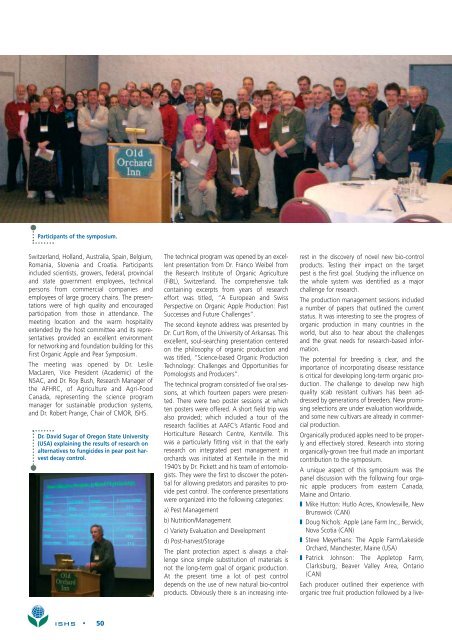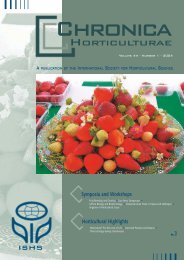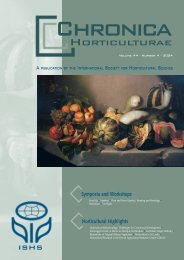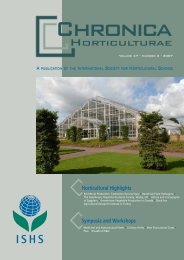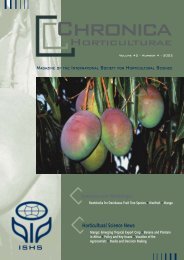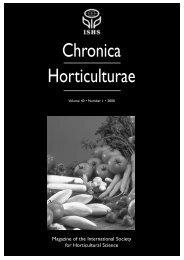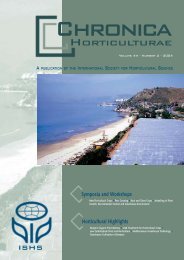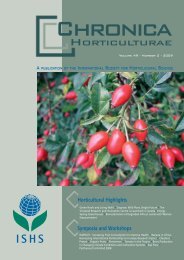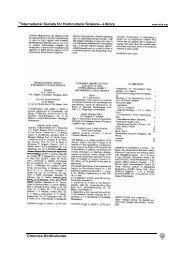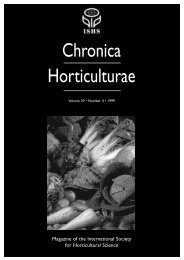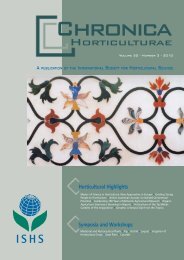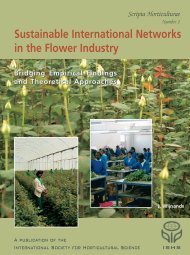Acta Horticulturae
Acta Horticulturae
Acta Horticulturae
Create successful ePaper yourself
Turn your PDF publications into a flip-book with our unique Google optimized e-Paper software.
Participants of the symposium.<br />
Switzerland, Holland, Australia, Spain, Belgium,<br />
Romania, Slovenia and Croatia. Participants<br />
included scientists, growers, federal, provincial<br />
and state government employees, technical<br />
persons from commercial companies and<br />
employees of large grocery chains. The presentations<br />
were of high quality and encouraged<br />
participation from those in attendance. The<br />
meeting location and the warm hospitality<br />
extended by the host committee and its representatives<br />
provided an excellent environment<br />
for networking and foundation building for this<br />
First Organic Apple and Pear Symposium.<br />
The meeting was opened by Dr. Leslie<br />
MacLaren, Vice President (Academic) of the<br />
NSAC, and Dr. Roy Bush, Research Manager of<br />
the AFHRC, of Agriculture and Agri-Food<br />
Canada, representing the science program<br />
manager for sustainable production systems,<br />
and Dr. Robert Prange, Chair of CMOR, ISHS.<br />
Dr. David Sugar of Oregon State University<br />
(USA) explaining the results of research on<br />
alternatives to fungicides in pear post harvest<br />
decay control.<br />
The technical program was opened by an excellent<br />
presentation from Dr. Franco Weibel from<br />
the Research Institute of Organic Agriculture<br />
(FiBL), Switzerland. The comprehensive talk<br />
containing excerpts from years of research<br />
effort was titled, “A European and Swiss<br />
Perspective on Organic Apple Production: Past<br />
Successes and Future Challenges”.<br />
The second keynote address was presented by<br />
Dr. Curt Rom, of the University of Arkansas. This<br />
excellent, soul-searching presentation centered<br />
on the philosophy of organic production and<br />
was titled, “Science-based Organic Production<br />
Technology: Challenges and Opportunities for<br />
Pomologists and Producers”.<br />
The technical program consisted of five oral sessions,<br />
at which fourteen papers were presented.<br />
There were two poster sessions at which<br />
ten posters were offered. A short field trip was<br />
also provided; which included a tour of the<br />
research facilities at AAFC’s Atlantic Food and<br />
Horticulture Research Centre, Kentville. This<br />
was a particularly fitting visit in that the early<br />
research on integrated pest management in<br />
orchards was initiated at Kentville in the mid<br />
1940’s by Dr. Pickett and his team of entomologists.<br />
They were the first to discover the potential<br />
for allowing predators and parasites to provide<br />
pest control. The conference presentations<br />
were organized into the following categories:<br />
a) Pest Management<br />
b) Nutrition/Management<br />
c) Variety Evaluation and Development<br />
d) Post-harvest/Storage<br />
The plant protection aspect is always a challenge<br />
since simple substitution of materials is<br />
not the long-term goal of organic production.<br />
At the present time a lot of pest control<br />
depends on the use of new natural bio-control<br />
products. Obviously there is an increasing inte-<br />
rest in the discovery of novel new bio-control<br />
products. Testing their impact on the target<br />
pest is the first goal. Studying the influence on<br />
the whole system was identified as a major<br />
challenge for research.<br />
The production management sessions included<br />
a number of papers that outlined the current<br />
status. It was interesting to see the progress of<br />
organic production in many countries in the<br />
world, but also to hear about the challenges<br />
and the great needs for research-based information.<br />
The potential for breeding is clear, and the<br />
importance of incorporating disease resistance<br />
is critical for developing long-term organic production.<br />
The challenge to develop new high<br />
quality scab resistant cultivars has been addressed<br />
by generations of breeders. New promising<br />
selections are under evaluation worldwide,<br />
and some new cultivars are already in commercial<br />
production.<br />
Organically produced apples need to be properly<br />
and effectively stored. Research into storing<br />
organically-grown tree fruit made an important<br />
contribution to the symposium.<br />
A unique aspect of this symposium was the<br />
panel discussion with the following four organic<br />
apple producers from eastern Canada,<br />
Maine and Ontario.<br />
❚ Mike Hutton: Hutlo Acres, Knowlesville, New<br />
Brunswick (CAN)<br />
❚ Doug Nichols: Apple Lane Farm Inc., Berwick,<br />
Nova Scotia (CAN)<br />
❚ Steve Meyerhans: The Apple Farm/Lakeside<br />
Orchard, Manchester, Maine (USA)<br />
❚ Patrick Johnson: The Appletop Farm,<br />
Clarksburg, Beaver Valley Area, Ontario<br />
(CAN)<br />
Each producer outlined their experience with<br />
organic tree fruit production followed by a live-<br />
ISHS • 50


